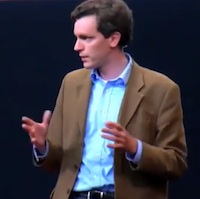
One of the most powerful weapons a politician has is their words. By controlling language they can shape perceptions. Just think of the effect a phrase like “estate tax” has when turned to “death tax.” Far more powerful, right?
In this TED Talk, Etymologist Mark Forsyth walks us through some historical examples of how politicians have tried to influence our perceptions through language. He says that it wasn’t until 1771 that the British Parliament allowed newspapers to report the exact words said during debates — thanks to the courage of Brass Crosby (the man who inspired the phrase “As bold as Brass”).
The notion that language changes reality even influences the beginning of the United States. Technically, the House and Senate have never actually agreed on the term for the country’s leader. They wanted to pick a name which would be taken seriously, but also wouldn’t allow a leader to get drunk on power. After weeks of debating they finally allowed “President” (meaning “overseer”) to be a temporary title.
But Forsyth doesn’t think language has all the power in the end. He says that it is actually history which grants a word or phrase its value. For example, “President” began as a meager term, but now 147 countries have designated their leaders “President” as well, because they want to bestow the same grandeur upon their leader that the U.S. President has.
This is all true, but I’d like to remind Forsyth not to forget the effect a simple choice of words can have on the here and now. Sometimes throwing out “drilling for oil” in exchange for “exploring for energy” can get the support you need now rather than hundreds of years later.
Leave a Reply